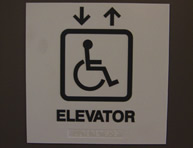| "Nothing About Us Without
Us" by Rodolfo Cattani, picture by Attilio Ruffo Towards a UN
convention to protect the rights of persons with
disabilities. | |
|
The General Assembly of
the United Nations has established in 2003 an ad hoc commission to promote
and defend the basic rights of persons with disabilities. The commission
is open to all UN state members and at the moment there are close to 70
governments represented. The mandate entrusted by the General Assembly to
the commission concerning the document to be written is rather general and
it took some time to arrive at a position shared by all on the text of the
convention's outline. The organizations representing persons with disabilities have taken a highly important role, participating actively in the informal meetings of the commission, during which, as it often happens, the most substantial discussions took place and where were adopted the most significant orientations. This has allowed the World Blind Union (WBU) to decide firmly its own positions which are presented and explained in a manifesto created on the occasion. The world organizations representing persons with disabilities have constructively worked together, but the most noteworthy news is the presence of disabled experts within the official delegations from many states on various continents. A convention is an agreement between states that commit themselves to respect the convention's principles; the convention's provisions legally link them to the states and come into force only after their ratification by each state. In general, conventions are not subject to modifications since they are planned to be used for many years; however, it can happen that their interpretation can change on the basis of observations by the monitoring committee. As a matter of fact, each convention needs to have a rigorous and efficient monitoring committee to guarantee its effective implementation in various countries. In this specific case, such a committee is even more important since persons with disabilities are not able to have considerable political influence on their governments. At the present time, there are seven conventions by the United Nations concerning the different areas of political, social, and cultural rights based official standards in matters of human rights. The International Convention  for the protection of the rights and dignity of persons with
disabilities must be omnicomprehensive and widely inclusive; it represents
an important change in the way of thinking since it sanctions that the
exclusion of persons with disabilities from enjoying fully their basic
rights cannot in any way be justified as descending from their conditions,
but is rather sanctioned as deprivation of a person's right. for the protection of the rights and dignity of persons with
disabilities must be omnicomprehensive and widely inclusive; it represents
an important change in the way of thinking since it sanctions that the
exclusion of persons with disabilities from enjoying fully their basic
rights cannot in any way be justified as descending from their conditions,
but is rather sanctioned as deprivation of a person's right.The Convention should consequently include the recognition of the right of persons with disabilities to fully enjoy their human rights and the list of appropriate measures to guarantee to them the possibility to do so. Aside from the adoption of the Convention, it seems necessary to include the subject of disability in the monitoring process in all existing UN conventions pertaining to human rights. While the represented organizations, among which the WBU, have untiringly defended its implementation based on legal rights, some governments are not yet willing to state the question in these terms, preoccupied by obligations, but also because of the costs of the measures involved in the implementation of the Convention. This is why it is taking a rather long time and, undoubtedly, the awareness and understanding process on the part of governments is rather tiring. The disability movement's motto, highly clear and significant, is still "Nothing about us without us" and governments, even if they have the last word, cannot easily ignore the point of view of the disability organizations which should for that reason carry out clear and united positions. |
|


